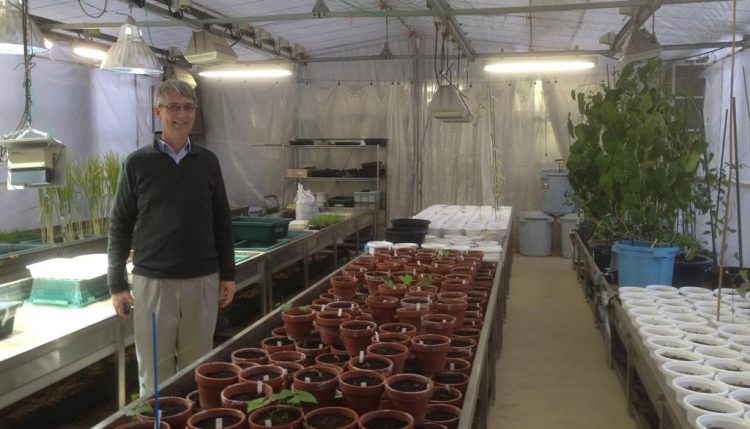
MAFF Japan calls for more attention to basic research in root and tuber crops
…provides funds to drive an initiative aiming to increase productivity and use of food yam in Africa
The Japanese Ministry of Agriculture, Forestry and Fishery (MAFF) has provided funds to roll into action a second phase of its collaborative MAFF-IITA yam project, as part of efforts to ensure that the productivity and utilization of food yam in Africa would increase.

David De Koeyer in the greenhouse at IBRC, where yam clones used in sequencing the genome of Dioscorea
rotundata are grown. IBRC is a key partner in the AfricaYam project led by IITA.
Specifically, the initiative will enhance a broader understanding of the basic agronomic traits of yam among researchers and boost breeding activities on the African continent.
Consequently, three IITA scientists of the MAFF-IITA yam project, David De Koeyer, Head of Yam Breeding; Haruki Ishikawa, Plant Physiologist; and Ryo Matsumoto— the project’s new Postdoctoral Scientist and Yam Agronomist — paid a courtesy visit to MAFF on 17-21 April to express IITA’s appreciation for the support from Japan, not only in terms of funding, but also through various kinds of collaboration, exchange of ideas, and development of human capacities for scientists and students. They also shared future plans of the project. The team was accompanied by Kohtaro Iseki, JIRCAS scientist based at IITA.
Ishikawa, Project Leader said, “Recently, IITA restructured its strategy to focus primarily on enhancing both the delivery and basic research of each priority crop. So balancing delivery and research is the new vision of IITA. This is why we visited our collaborators in Japan and had lively discussions through which various propositions for collaboration in yam research were established. It was a really fruitful visit. This project can contribute greatly to basic studies of yam aimed at improving productivity and nutrition.”
To explore new areas of collaboration the team also visited partner institutions and potential partners such as the Ministry of Foreign Affairs (MoFA), the Japan International Research Center for Agricultural Sciences (JIRCAS) in Tsukuba, the KAWABE Noken Sangyo K.K. in Tokyo, the Iwate Biotechnology Research Center in Iwate as well as the Tokyo University of Agriculture.
At the end of the visits, De Koeyer said, “Our travel was a great success and will enhance further collaboration and capacity building between IITA and Japan.”
